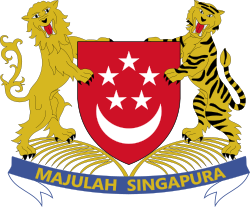List
| This article is part of a series on |
 |
|---|
| Election [5] [6] | MP(s) [7] | Constituency | Party | Parliament | Number of NCMPs appointed | |
|---|---|---|---|---|---|---|
| 1981 (b) | J. B. Jeyaretnam | Anson | WP | 5th | Scheme did not exist | |
| 1984 | Chiam See Tong | Potong Pasir | Singapore Democratic Party (SDP) | 6th | 1 | |
| J. B. Jeyaretnam | Anson | WP | ||||
| 1988 | Chiam See Tong | Potong Pasir SMC | SDP | 7th | 2 | |
| 1991 | Cheo Chai Chen | Nee Soon Central SMC | 8th | N/A | ||
| Chiam See Tong | Potong Pasir SMC | |||||
| Ling How Doong | Bukit Gombak SMC | |||||
| Low Thia Khiang | Hougang SMC | WP | ||||
| 1997 | Chiam See Tong | Potong Pasir SMC | Singapore People's Party (SPP) | 9th | 1 | |
| Low Thia Khiang | Hougang SMC | WP | ||||
| 2001 | Chiam See Tong | Potong Pasir SMC | Singapore Democratic Alliance (SDA) | 10th | ||
| Low Thia Khiang | Hougang SMC | WP | ||||
| 2006 | Chiam See Tong | Potong Pasir SMC | SDA | 11th | ||
| Low Thia Khiang | Hougang SMC | WP | ||||
| 2011 | Chen Show Mao Sylvia Lim Low Thia Khiang Faisal Manap Pritam Singh | Aljunied GRC | 12th | 3 | ||
| Yaw Shin Leong | Hougang SMC | |||||
| 2012 (b) | Png Eng Huat | N/A | ||||
| 2013 (b) | Lee Li Lian | Punggol East SMC | ||||
| 2015 | Chen Show Mao Sylvia Lim Low Thia Khiang Faisal Manap Pritam Singh | Aljunied GRC | 13th | 3 | ||
| Png Eng Huat | Hougang SMC | |||||
| 2020 | Gerald Giam Sylvia Lim Faisal Manap Leon Perera Pritam Singh | Aljunied GRC | 14th | 2 | ||
| Dennis Tan | Hougang SMC | |||||
| Louis Chua He Ting Ru Jamus Lim Raeesah Khan | Sengkang GRC | |||||
| 2025 | Fadli Fawzi Gerald Giam Sylvia Lim Pritam Singh Kenneth Tiong | Aljunied GRC | 15th | |||
| Dennis Tan | Hougang SMC | |||||
| Abdul Muhaimin Louis Chua He Ting Ru Jamus Lim | Sengkang GRC | |||||
- (b) = by-election